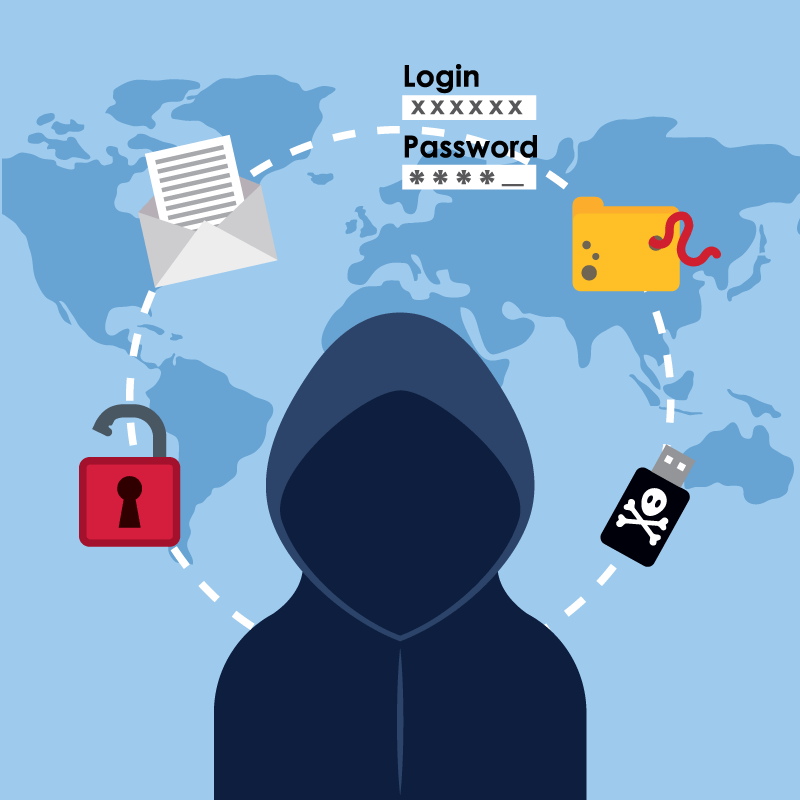According to a 2019 identity fraud study from Javelin, 14.4 million people fell victim to identity theft in 2018. Almost a quarter of those victims had remaining personal expenses related to the fraud, and the median loss was $375 among cases reported to the Federal Trade Commission.
Often identity theft is related to fraud, and as technology tied to personal identity has advanced in recent years, so have the skills of criminals in extracting personal identity details. Most of us know by now to ignore emails from entities claiming to be the Internal Revenue Service (the IRS will never email you to confirm your identity or request info), and those African princes trying to wire you millions in free money don’t really exist. However, with cybersecurity breaches replacing mail fraud, and shady websites posing as retail outlets, the new onslaught of fraud and identity theft beckons new tips for staying safe. Here is a brief checklist for protecting your personal finances, identity, and overall well-being.
How Do You Know If Your identity Has Been Stolen?
These days many credit card companies have built-in safeguards and automatic systems to alert you if they suspect criminal access to your financial accounts has been made. Typically these companies will call or text you first, or free your accounts and contact you via the method of communication listed as your preferred way to communicate. However, sometimes you won’t know until your credit report takes a significant hit, or you are contacted by a creditor for non-payment.
It is recommended that you check your credit accounts at least once per week, and check your credit score at least twice monthly. This will allow you to quickly react and contact your creditors in the event that suspicion activity shows up on your statements. Credit card providers have systems in place to assist you, and most will wipe debts off your overall credit line if you can prove you were nowhere near the location of multiple purchases or didn’t authorize any online payment that stands out compared to your normal shopping habits and monthly expenses.

Who Do You Call When Your Identity Is Stolen?
Anyone and everyone that controls your lines of credit, and your bank account. That includes all of your credit card companies, your bank, and anyone you do business with. Sometimes identity thieves want more than just your credit cards, sometimes they will assume your identity for the purpose of securing loans, or completing large purchases. In addition to making calls, you will also want to freeze your accounts.
Make sure that you report your credit or debit cards stolen immediately, even if you still possess the physical plastic cards. BankRate.com summarizes this well:
“Reporting a lost or stolen ATM or debit card before any fraudulent transactions will let you off the hook for any charges made thereafter. Otherwise, you have a short window of two business days after learning about the loss to report unauthorized charges or transfers at a maximum loss of $50. The liability limit increases to $500 if you report between two and 60 days after the statement reflecting the fraud is mailed. Reporting after 60 days can leave you with unlimited liability.”
Another important tip about additional entities to contact comes from DaveRamsey.com:
“If any utility providers, credit card companies, loan specialists, debt collectors or insurance companies are sending you bills for things you don’t actually owe, you need to reach out to them ASAP and let them know your identity was stolen. Even if you haven’t received any bogus bills from your providers or credit card companies, go ahead and contact them anyway. Because if one of your accounts was hacked, chances are, the others are also at risk.”
What Other Steps Should You Take If Your Identity Is Stolen?
Take a couple deep breaths and don’t panic. While the thought of a stranger having control over your finances and livelihood is unnerving, there are systems in place and steps to take when identity theft happens, and just remember it is more common than you think, so support is readily available.
US News provides a solid list of checklist tasks in the event of identity theft:
- File a report with the Federal Trade Commission.
- Contact your local police department.
- Notify the IRS and your identity theft insurance, if applicable.
- Place a fraud alert on your credit reports.
- Freeze your credit.
- Sign up for a credit monitoring service, if offered.
- Tighten security on your accounts.
- Review your credit reports for mystery accounts.
- Scan credit card and bank statements for unauthorized charges.
- Open new credit card and financial accounts.
____________________________
If you found our blog looking for financial advice or assistance with credit card debt relief or debt consolidation, call Golden Financial Services today at (866)-376-9846 or info@goldenfs.org. You can check out the rest of our blog here, and do your research on our services here. Let’s talk soon!


